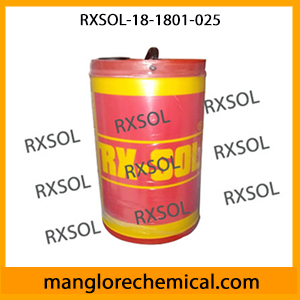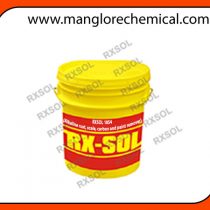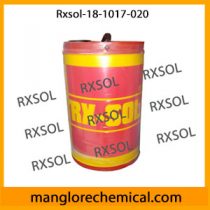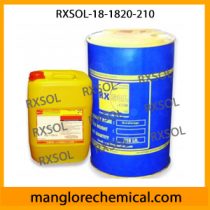Product Name
RXSOL-18-1801-025
Product Type
Anti Skid Powder
Company Details:
RX MARINE INTERNATIONAL
105, A wing , BSEL , TECH PARK.
VASHI ,NEW BOMBAY 400703 INDIA
Phone
+91 22 65113333 / 5555 / 9999
Fax
+91 22 2781 1318 :::AOH :0091 9821214367
Email
mail@rxmarine.com
Name
CAS number
% by weight
alumina
1344-28-1
50 – 100
Physical State
Solid. [Powder.]
Odor
Odorless.
OSHA/HCS status
This material is considered hazardous by the OSHA Hazard Communication Standard
(29 CFR 1910.1200).CONTAINS MATERIAL THAT CAN CAUSE TARGET ORGAN DAMAGE. Avoid exposure – obtain special instructions before use. Contains material that can cause target organ damage.
Eyes
No known significant effects or critical hazards.
Skin
No known significant effects or critical hazards.
Inhalation
No known significant effects or critical hazards.
Ingestion
No known significant effects or critical hazards.
Potential chronic health
effects
CARCINOGENIC EFFECTS
Not available.
MUTAGENIC EFFECTS
Not available.
TERATOGENIC EFFECTS
Not available.
Medical conditions
aggravated by overexposure
Pre-existing disorders involving any target organs mentioned in this MSDS as being at
risk may be aggravated by over-exposure to this product.
Eye contact
Check for and remove any contact lenses. Immediately flush eyes with plenty of
water for at least 15 minutes, occasionally lifting the upper and lower eyelids. Get
medical attention immediately.
Skin contact
In case of contact, immediately flush skin with plenty of water for at least 15 minutes
while removing contaminated clothing and shoes. Wash clothing before reuse.
Clean shoes thoroughly before reuse. Get medical attention immediately.
Inhalation
Move exposed person to fresh air. If not breathing, if breathing is irregular or if respiratory arrest occurs, provide artificial respiration or oxygen by trained personnel.
Loosen tight clothing such as a collar, tie, belt or waistband. Get medical attention
immediately.
Ingestion
Wash out mouth with water. Do not induce vomiting unless directed to do so by medical personnel. Never give anything by mouth to an unconscious person. Get medical attention immediately
Protection of first-aiders
No action shall be taken involving any personal risk or without suitable training. It
may be dangerous to the person providing aid to give mouth-to-mouth resuscitation.
Flammability of the product
Non-flammable.
Products of combustion
Decomposition products may include the following materials:
metal oxide/oxides
Suitable
Use an extinguishing agent suitable for the surrounding fire.
Not suitable
None known.
Special exposure hazards
Promptly isolate the scene by removing all persons from the vicinity of the incident if
there is a fire. No action shall be taken involving any personal risk or without suitable
training. No specific fire or explosion hazard.
Special protective
equipment for fire-fighters
Fire-fighters should wear appropriate protective equipment and self-contained breathing apparatus (SCBA) with a full face-piece operated in positive pressure mode.
Personal precautions
No action shall be taken involving any personal risk or without suitable training. Evacuate surrounding areas. Keep unnecessary and unprotected personnel from entering. Do not touch or walk through spilled material. Provide adequate ventilation. Wear appropriate respirator when ventilation is inadequate. Put on appropriate personal protective equipment (see section 8).
Environmental precautions
Avoid dispersal of spilled material and runoff and contact with soil, waterways, drains and sewers. Inform the relevant authorities if the product has caused environmental pollution (sewers, waterways, soil or air).
Methods for cleaning up
Move containers from spill area. Approach release from upwind. Prevent entry into sewers, water courses, basements or confined areas. Vacuum or sweep up material and place in a designated, labeled waste container. Dispose of via a licensed waste disposal contractor. Note: see section 1 for emergency contact information and section 13 for waste disposal.
Handling
Put on appropriate personal protective equipment (see section 8). Eating, drinking and smoking should be prohibited in areas where this material is handled, stored and processed. Workers should wash hands and face before eating, drinking and smoking. Do not get in eyes or on skin or clothing. Do not ingest. If during normal use the material presents a respiratory hazard, use only with adequate ventilation or wear appropriate respirator. Keep in the original container or an approved alternative made from a compatible material, kept tightly closed when not in use.
Empty containers retain product residue and can be hazardous. Do not reuse container.
Storage
Store in accordance with local regulations. Store in original container protected from direct sunlight in a dry, cool and well-ventilated area, away from incompatible materials (see section 10) and food and drink. Keep container tightly closed and sealed until ready for use. Containers that have been opened must be carefullyresealed and kept upright to prevent leakage. Do not store in unlabeled containers.
Use appropriate containment to avoid environmental contamination.
Product name
Exposure limits
alumina
ACGIH TLV (United States, 1/2007).
TWA: 10 mg/m³ 8 hour(s).
OSHA PEL (United States, 11/2006).
TWA: 5 mg/m³ 8 hour(s). Form: Respirable fraction
OSHA PEL 1989 (United States, 3/1989).
TWA: 10 mg/m³ 8 hour(s). Form: Dust
NIOSH REL (United States, 12/2001). Notes: as Al
TWA: 5 mg/m³, (as Al) 10 hour(s).
Engineering measures
If user operations generate dust, fumes, gas, vapor or mist, use process enclosures, local exhaust ventilation or other engineering controls to keep worker exposure to airborne contaminants below any recommended or statutory limits.
Eyes
Safety eyewear complying with an approved standard should be used when a risk assessment indicates this is necessary to avoid exposure to liquid splashes, mists, gases or dusts.
Skin
Personal protective equipment for the body should be selected based on the task being performed and the risks involved and should be approved by a specialist before handling this product.
Respiratory
Use a properly fitted, air-purifying or air-fed respirator complying with an approved standard if a risk assessment indicates this is necessary. Respirator selection must be based on known or anticipated exposure levels, the hazards of the product and the safe working limits of the selected respirator.
Hands
Chemical-resistant, impervious gloves complying with an approved standard should be worn at all times when handling chemical products if a risk assessment indicates this is necessary.
Hygiene measures
Wash hands, forearms and face thoroughly after handling chemical products, before eating, smoking and using the lavatory and at the end of the working period. Appropriate techniques should be used to remove potentially contaminated clothing. Wash contaminated clothing before reusing. Ensure that eyewash stations and safety showers are close to the workstation location.
Physical state
Solid. [Powder.]
Color
White.
Odor
Odorless.
Relative density
3.92 g/cm3 32.71 pounds/gallon
Solubility
Insoluble in the following materials: cold water and hot water.
Stability and reactivity
The product is stable.
Hazardous decomposition products
Under normal conditions of storage and use, hazardous decomposition products
should not be produced.
Hazardous polymerization
Under normal conditions of storage and use, hazardous polymerization will not
occur.
Chronic effects on humans
Contains material which may cause damage to the following organs: lungs, upper
respiratory tract, skin, eye, lens or cornea.
Other toxic effects on
humans
No specific information is available in our database regarding the other toxic effects
of this material to humans
Specific effects
Carcinogenic effects
No known significant effects or critical hazards.
Mutagenic effects
No known significant effects or critical hazards.
Reproduction toxicity
No known significant effects or critical hazards.
Chronic effects
Contains material that can cause target organ damage.
Target organs
Contains material which may cause damage to the following organs: lungs, upper respiratory tract, skin, eye, lens or cornea.
Environmental precautions
No known significant effects or critical hazards.
Products of degradation
Some metallic oxides
Waste disposal
The generation of waste should be avoided or minimized wherever possible. Empty containers or liners may retain some product residues. This material and its container
must be disposed of in a safe way. Dispose of surplus and non-recyclable products via
a licensed waste disposal contractor. Disposal of this product, solutions and any by products should at all times comply with the requirements of environmental protection and waste disposal legislation and any regional local authority requirements. Avoid dispersal of spilled material and runoff and contact with soil, waterways, drains and sewers.
Regulatory information
UN number
Proper shipping name
Class
PG*
Label
Additional information
DOT Classification
Not regulated.
–
–
–
–
TDG Classification
Not regulated.
–
–
–
–
ADR/RID Class
Not regulated.
–
–
–
–
IMDG Class
Not regulated.
–
–
–
Marine pollutant: No.
IATA-DGR Class
Not regulated.
–
–
–
–
Clean Air Act (CAA) 112 accidental release prevention:
N/A
Clean Air Act (CAA) 112 regulated flammable substances:
N/A
Clean Air Act (CAA) 112 regulated toxic substances:
N/A
To the best of our knowledge, the information contained herein is accurate. However, neither the above-named supplier, nor any of its subsidiaries, assumes any liability whatsoever for the accuracy or completeness of the information contained herein. Final determination of suitability of any material is the sole responsibility of the user.
|







Reviews
There are no reviews yet.